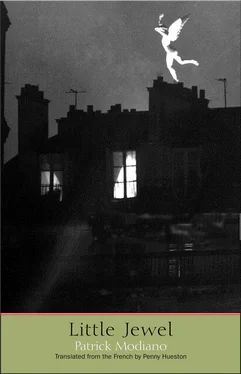Patrick Modiano
Little Jewel
IT MUST HAVE been about twelve years since anyone had called me Little Jewel. I found myself at Châtelet metro station at peak hour. I was in the crowd heading along the endless corridor on the moving walkway. There was a woman wearing a yellow coat. The colour of the coat caught my eye and I observed her from the back on the walkway. Then she headed down the corridor marked DIRECTION CHÂTEAU DE VINCENNES. Now we were all squashed against each other in the middle of the staircase, waiting for the barrier to open. She was standing next to me. I saw her face. She was so like my mother that I thought it must be her.
I remembered one of the few photos I have kept of my mother. It’s as if a searchlight trained on her face had made it loom out of the darkness. I’ve always felt uneasy looking at this photo. Every time it appeared in my dreams, it was like an identikit photo that someone was showing me — a police superintendent, an employee at the morgue — so that I could identify this person.
I did not say a word. I knew nothing about the woman. She sat down on one of the benches in the station, away from the people jostling on the edge of the platform while they waited for the train. There was no room on the bench next to her; I stood to the side, leaning against a vending machine. Her coat had no doubt been fashionable at one time and its colour gave it a touch of flair. But the yellow had faded almost to grey. She seemed oblivious to everything around her and I wondered if she would stay there all evening, on the bench, until the last metro. She had the same profile as my mother, that distinctive nose, slightly upturned. The same bright eyes. The same high forehead. Her hair was shorter. She hadn’t changed much. Her hair was not as blonde anymore, but, after all, I had no idea if my mother had been a true blonde. Her mouth was set in a bitter grimace. I was certain it was her.
She let a train go past. The platform was empty for a few minutes. I sat down on the bench next to her. Then another dense crowd swarmed onto the platform. I could have struck up a conversation with her. I couldn’t find the words and there were too many people around us.
She was about to fall asleep on the bench but, when the noise of the next train was still only a distant rumbling, she got to her feet. I stepped into the carriage, just behind her. We were separated by a group of men who were speaking loudly to each other. The doors shut and that’s when I realised I should have taken the train going in the other direction, as I normally did. At the next station, I was pushed onto the platform by the tide of people alighting, then I stepped back into the carriage and moved over to stand next to her.
In the stark light, she looked older than she had on the platform. Her left temple and part of her cheek were scarred. How old was she? Fifty or so? And how old was she in the photos? Twenty-five? Her expression was the same as when she was twenty-five, clear, revealing astonishment or an intimation of fear, and abruptly hardening. Her gaze happened to land on me, but she didn’t see me. She took a powder compact out of her coat pocket and opened it. She brought the mirror up to her face and ran the little finger of her left hand over the corner of her eyelid, as if she were wiping away a speck of dust. The train was speeding up, there was a jolt, I grabbed the metal railing, but she didn’t lose her balance. She remained impassive, staring at herself in the mirror. At Bastille, everyone somehow managed to get in, and the doors had trouble shutting. She had time to put away her compact before the new passengers poured into the carriage.
What station was she going to get off at? Would I follow her all the way? Was it really necessary? I had to get used to the idea that she lived in the same city as I did. I’d been told that she had died, a long time ago, in Morocco, and I’d never tried to find out anything more. ‘She died in Morocco’: one of those set phrases from childhood. I never really knew what it meant. A set phrase that echoes in the memory, like certain words from songs that used to frighten me. ‘There was once a little boat…’ ‘She died in Morocco.’ Her date of birth was entered on my birth certificate—1917—and, at the time the photos were taken, she claimed to be twenty-five. But she must have already been lying about her age and falsifying her papers in order to appear younger.
She turned up the collar of her coat as if she were feeling cold in the carriage, and yet we were all jammed in next to one another. I could see that the edge of her collar was frayed. How long had she been wearing that coat? Ever since the photos were taken? That’s why the yellow had faded. We were arriving at the end of the line and, from there, a bus would take us to a distant suburb. I’d approach her then. After Gare de Lyon, the carriage was less crowded. Once again, her gaze landed on me, but it was that look which passengers exchange unthinkingly. Do you remember they used to call me Little Jewel? You, too, went by another name back then. And even your first name, Sonia, was made up .
Now we were sitting opposite each other on the banquettes closest to the doors. I tried to find you in the phone book and I even telephoned four or five people with the same surname, but they had never heard of you. I told myself that one day I would go to Morocco. It was the only way to verify whether you were in fact dead .
After Nation the carriage was empty, but she was still there, sitting opposite me, her hands clasped and the sleeves of the discoloured coat revealing her wrists. Bare, chapped hands, without rings or bracelets. In the photos, she was wearing bracelets and rings — clunky jewellery popular at the time. But these days, nothing. She had shut her eyes. Three more stops and it would be the end of the line. The train would terminate at Château de Vincennes, and I would stand up as gently as possible, and get out of the carriage, leaving her asleep on the seat. I would take the other train, in the direction of Pont de Neuilly, as I would have done had I not noticed that yellow coat in the corridor.
The train pulled into Bérault station. She opened her eyes, which had taken on that hard glare again. She glanced at the platform, and stood up. Once again, I followed her along the corridor, but now we were alone. Then I noticed she was wearing those knitted slipper socks called panchos , which accentuated her dancer’s gait.
A wide avenue, lined with apartment buildings, on the border between Vincennes and Saint-Mandé. Night was falling. She crossed the avenue and went into a phone box. I waited for the lights to change a few times, and then I crossed, too. In the phone box, she took a while to find change or a token. I feigned interest in the window of the nearest shop, a chemist displaying the poster that terrified me in my childhood: the devil blowing fire out of his mouth. I turned away. She dialled a number slowly, as if for the first time, and then held the receiver against her ear with both hands. But there was no answer. She hung up. She took a bit of paper out of one of her coat pockets and stared at it while her finger dialled. That’s when I wondered whether she had a home somewhere.
This time, someone replied. Behind the pane of glass, her lips were moving. She was again holding the receiver with both hands and, from time to time, she shook her head, as if to focus her attention. From the movement of her lips, she was speaking louder and louder, more vehemently, but eventually she calmed down. Who could she possibly be calling? Among the few remaining things of hers in my possession, inside a metal biscuit tin, were a diary and an address book from the period of the photos, back when I was called Little Jewel. When I was younger, I had no interest in looking at the diary or the address book, but for some time now, in the evenings, I would turn the pages. Names. Telephone numbers. I knew there was no point in dialling the numbers. What’s more, I had no desire to.
Читать дальше












